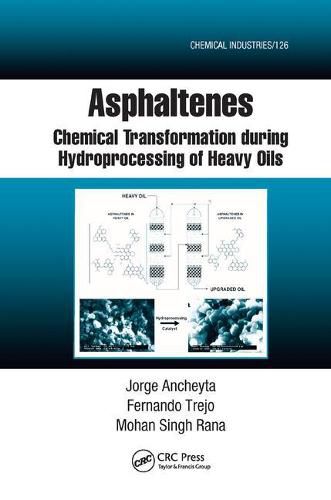Readings Newsletter
Become a Readings Member to make your shopping experience even easier.
Sign in or sign up for free!
You’re not far away from qualifying for FREE standard shipping within Australia
You’ve qualified for FREE standard shipping within Australia
The cart is loading…






During the upgrading of heavy petroleum, asphaltene is the most problematic impurity since it is the main cause of catalyst deactivation and sediments formation. Exploring many aspects related to asphaltenes composition and conversion, Asphaltenes: Chemical Transformation during Hydroprocessing of Heavy Oils highlights the various changes that these heavy and complex molecules undergo during catalytic hydroprocessing.
After defining and characterizing asphaltene structure, the book examines the composition of petroleum and the processes and catalysts for upgrading heavy oils. It then details the characterization of asphaltenes after hydroprocessing and the effect of reaction conditions on their structures. The authors also analyze the deactivation and characterization of spent hydroprocessing catalysts as well as the role played by asphaltenes. They cover sediments formation during hydroprocessing and the role of asphaltenes on it. The final chapters describe the hydrocracking and kinetics of asphaltenes and the fractionation of heavy crudes and asphaltenes.
Due to the increasing production of heavy crude oils, asphaltene has become one of the most studied molecules. This book provides a deep understanding of how asphaltenes transform during hydroprocessing, offering insight on designing catalysts and processing for the upgrading of heavy oils.
$9.00 standard shipping within Australia
FREE standard shipping within Australia for orders over $100.00
Express & International shipping calculated at checkout
During the upgrading of heavy petroleum, asphaltene is the most problematic impurity since it is the main cause of catalyst deactivation and sediments formation. Exploring many aspects related to asphaltenes composition and conversion, Asphaltenes: Chemical Transformation during Hydroprocessing of Heavy Oils highlights the various changes that these heavy and complex molecules undergo during catalytic hydroprocessing.
After defining and characterizing asphaltene structure, the book examines the composition of petroleum and the processes and catalysts for upgrading heavy oils. It then details the characterization of asphaltenes after hydroprocessing and the effect of reaction conditions on their structures. The authors also analyze the deactivation and characterization of spent hydroprocessing catalysts as well as the role played by asphaltenes. They cover sediments formation during hydroprocessing and the role of asphaltenes on it. The final chapters describe the hydrocracking and kinetics of asphaltenes and the fractionation of heavy crudes and asphaltenes.
Due to the increasing production of heavy crude oils, asphaltene has become one of the most studied molecules. This book provides a deep understanding of how asphaltenes transform during hydroprocessing, offering insight on designing catalysts and processing for the upgrading of heavy oils.